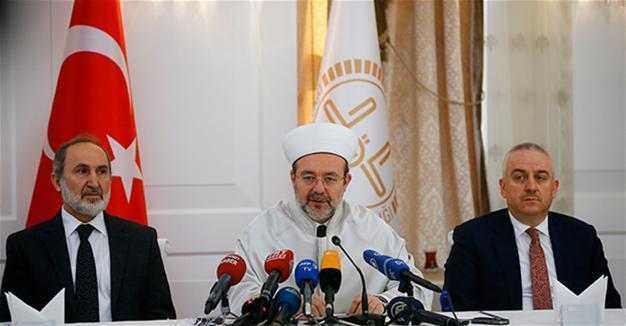Raid on imams stems from political competition in Germany: Top religious official
Sevil Erkuş - ANKARA

AA photo
Accusations of espionage against Turkish imams in Germany stemmed from a “defamation campaign” that was tied to the political climate ahead of elections in the country, Turkey’s top religious official has said.“It is unacceptable for Islamophobic hate to become an [issue] in the election atmosphere,” Mehmet Görmez, the head of Turkey’s Religious Affairs Directorate (Diyanet), told a group of journalists on Feb. 17.
Görmez slammed Germany for the raid on the houses of four religious officials working under the Turkish Islamic Union for Religious Affairs (DİTİB) in the areas of Bad Godesberg, Fürthen-Sieg, Engelskirchen and Bergneustadt.
His remarks came after German police raided on Feb. 15 the apartments of four imams suspected of conducting espionage on behalf of the Turkish government against followers of U.S.-based Islamic preacher Fethullah Gülen, which Ankara accuses of organizing the failed coup attempt on July 15, 2016.
“The personal computer of two religious officials has been confiscated as part of an investigation for alleged unlawful intelligence activities by the officials. We have already declared publicly and to the German officials that they have not been pursuing any intelligence activities,” he stated.
He rejected accusations that the clerics were engaged in spying but acknowledged they had “exceeded their powers.”
Six imams were recalled to Turkey as an expression of goodwill in order not to harm bilateral ties, but police still raided the homes of the returning imams, he said, claiming the move was aimed at “rekindling a political debate” ahead of elections.
“We consider the raid on the religious officials who returned to Turkey as an action taken to exacerbate the political debate,” he said.
No religious official has ever been permitted to engage in activities outside of the purview of their position, Görmez said, adding that there was no illegal activity during this period.
The imams were members of DİTİB, Germany’s largest association of mosques, which brings imams from Turkey to serve the approximately 3 million people with a Turkish background who live here.
He confirmed that a letter was sent to religious attachés in Turkish embassies abroad last year in a bid to “protect” Turkish citizens there from the Fethullahist Terror Organization (FETÖ), as the directorate does against the Islamic State of Iraq and the Levant (ISIL).
“Of course, it is our duty to protect our citizens from a movement that has harmed our nation and the whole of humanity by exploiting religion all over the world for 40 years [just as] we protect our citizens from terrorist organizations such as Deash [the Arabic acronym of ISIL],” he stated.
“If there was Deash instead of FETÖ in that letter, would we be doing this press conference today?” he asked, referring to an order issued on Sept. 20 last year by the Diyanet.
The order was “not about personal lives, but about terrorist organizations,” Görmez said, adding that his organization recalled imams who informed them about individuals as a gesture of goodwill.
















